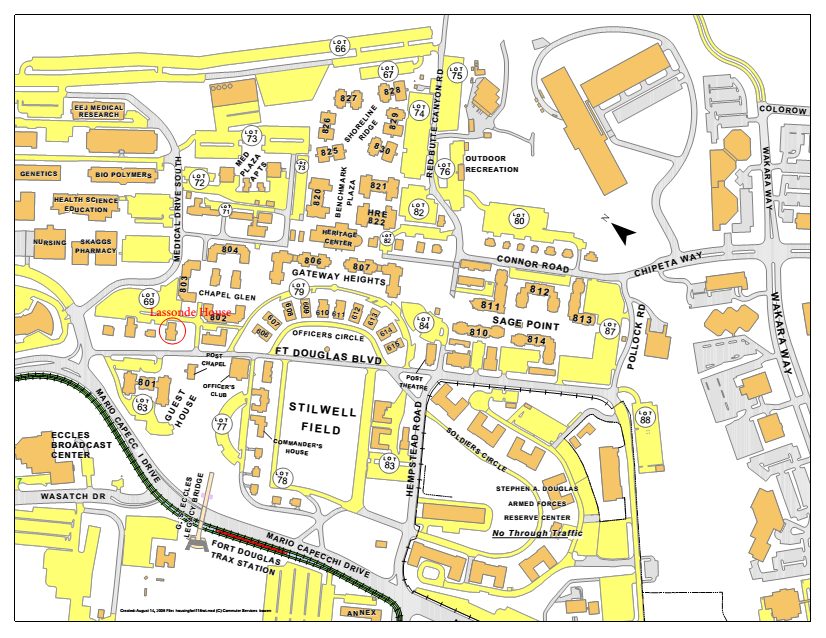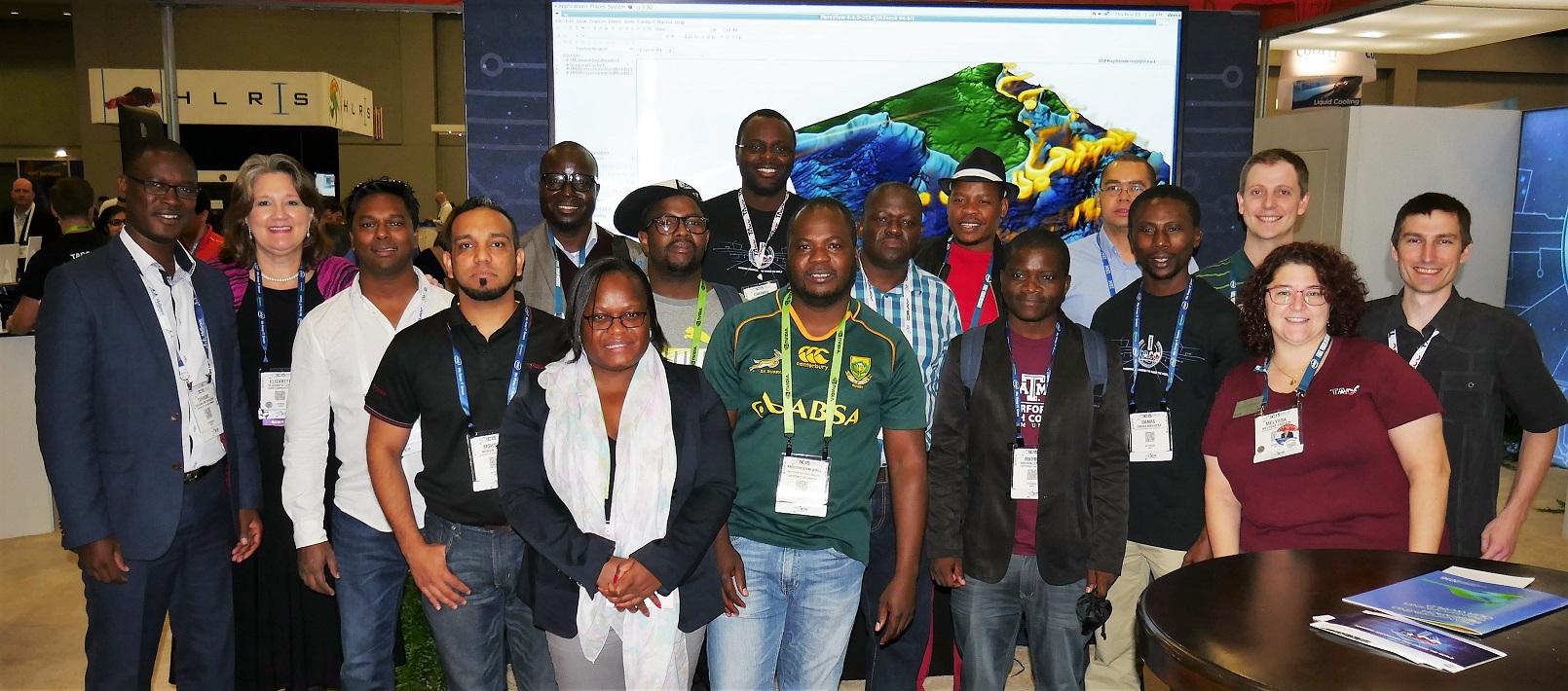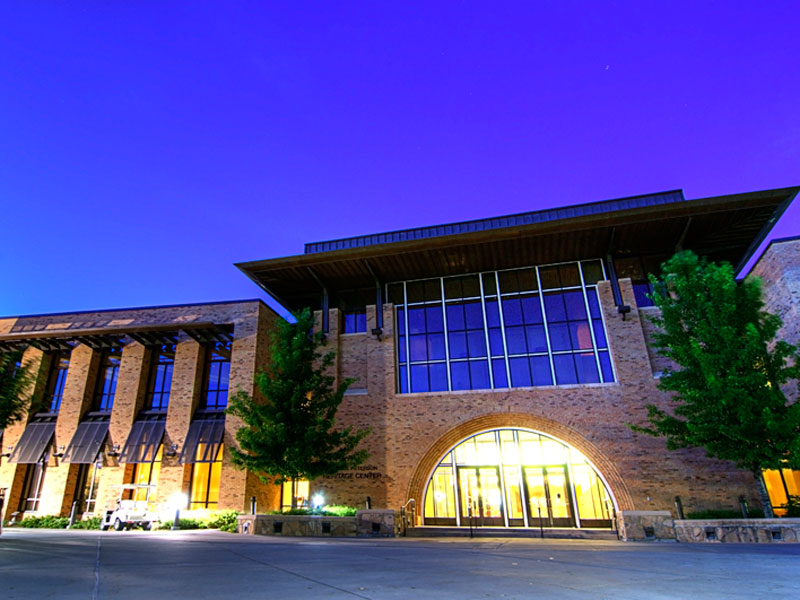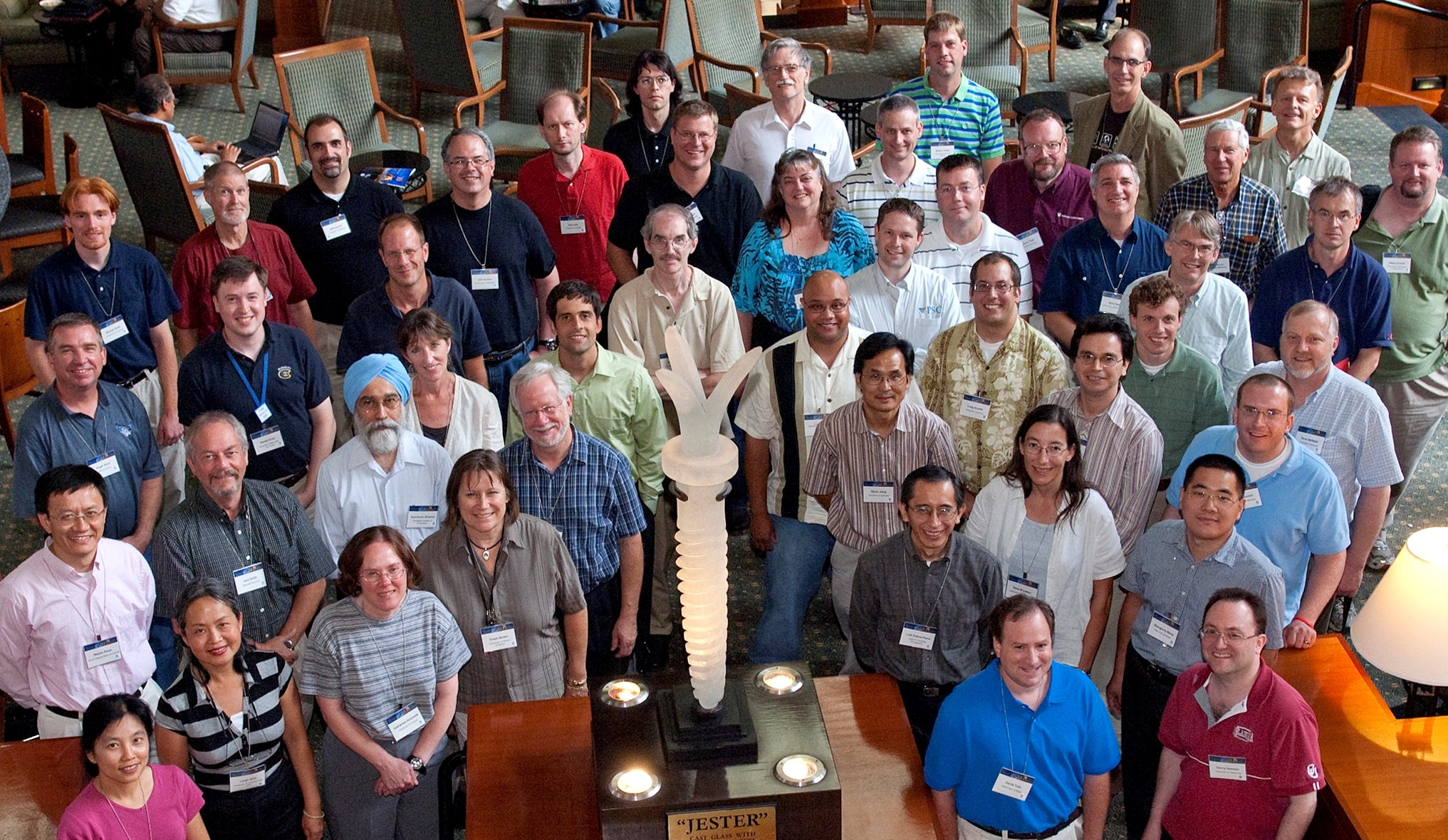This is not a public event. Delegates were chosen via a competitive application and selection process.
We appreciate the organizations that sponsored this activity, including the U.S. National Science Foundation (grant number 1657644), Cray Computing, Google, SC16, the Square Kilometre Array Readiness program, Airlink Airlines, Dell, Intel and others. Thank you!!!
Venue: University Guest House (UGH) on the University of Utah campus. There will be a daily shuttle to and from the Salt Palace Convention Center (bus schedule).
Agenda:
Friday, Nov. 11 4:00 p.m. to 8:00 p.m., UGH, Pierre Lassonde House
4:00 to 6:00 p.m. check-in, greeting, orientation and informational session. — Leake
6:00-8:00 p.m. networking and dinner, Pierre Lassonde House.
(Affinity pairings; research interests, recreational preferences, regional challenges, and technical proficiencies)
Saturday, Nov. 12, 2016 7:00 a.m., UGH Breakfast.
Saturday’s workshop will be held in the Officer’s Club (see map).

8:00 – 10:00 AM Introductions and convening by affinity (Leake, Brunson). At this session, we will begin to identify commonalities among US and Pan-African delegates according to research interests, recreational preferences, regional challenges, and technical proficiencies. The concept of multinational peer mentoring will be discussed. This session will be mostly discussion and engagement exercises.
10:00 – 10:20 AM Tea break.
10:20 – 12:20 AM Lessons learned from HPC decommission adoptions (Thorne, Johnston, Tshililo, Leake).
12:30 – 1:30 PM Working lunch on site. BoF tables.
1:30 – 2:45 PM HPC basic skills training methodologies, and how to communicate with researchers. (Neeman)
2:45 – 3:15 PM Break. No refreshments.
3:15 – 6:00 PM OneOCII, customer service and outreach (Neeman, Brunson).
Be sure to visit the OneOCII booth number 420 on the show floor (shared with Great Plains Network).
6:30 – 8:30 p.m. Dinner, continue the diversity discussion. Officer’s Club (see map).
Sunday, Nov. 13: No morning OCG activities are planned.
Beginning at 8:30 a.m.: SC16 Tutorials and Workshops, exhibitors reception, and other amazing programs begin at the Salt Palace Convention Center!
6:00 to 8:30 p.m., Dinner and a movie! Online training resources, and videos that can be used to promote HPC on your campus. UGH Bonneville Room.
Monday, Nov. 14, 6:00 a.m. to 7:30 a.m., Commanders House Parlors (see map).
Surveying the US/Pan-African landscape for emerging data aggregation sites; Julio Ibarra (Florida International University).
Dr. Ibarra leads the Center for Internet Augmented Research and Assessment (CIARA) at Florida International University. CIARA manages large-scale international projects that deploy advanced Internet technologies, and operates an international Internet exchange point.
The US National Science Foundation Division of Astronomical Sciences funds a variety of powerful radio, optical and solar telescopes on several continents that provide scientists with a better look at the universe. With the Square Kilometer Array being built in the Karoo region of South Africa, and the NSF-supported Large Synoptic Survey Telescope (LSST) being built in Chile, the global Astrophysics and Astronomy communities would benefit from having efficient and effective network services between the U.S., Africa and South America.
Jetstream is a cloud-based, on-demand system that offers on-demand, 24/7 access to computing and data analysis tools that are integrated into the national research ecosystem. It’s accessible and approachable to a wide range of researchers, and the first of its kind to be supported by the US National Science Foundation.
During SC16, a US/Pan-African Jetstream pilot will be discussed. The proposed pilot involves US and South African collaborators whose research involves African bioinformatics.
From the CyVerse web site: “CyVerse is funded by the US National Science Foundation’s Directorate for Biological Sciences. We are a dynamic virtual organization led by the University of Arizona to fulfill a broad mission that spans our partner institutions: Texas Advanced Computing Center, Cold Spring Harbor Laboratory, and the University of North Carolina at Wilmington.
CyVerse fills a niche created by the computing epoch and a rapidly evolving world. Developing solutions to today’s grand scientific challenges means that we must understand how the organisms that contribute to our food, fuels, and ecosystem are shaped by interactions with their environment. CyVerse provides life scientists with powerful computational infrastructure to handle huge datasets and complex analyses, thus enabling data-driven discovery. Our powerful extensible platforms provide data storage, bioinformatics tools, image analyses, cloud services, APIs, and more.”
Monday evening, dinner on your own.
Tuesday, Nov. 15: No morning OCG activities are planned. Sleep in!
Those who are new to SC won’t want to miss the introduction for first-time attendees from 4:30-5:15.
7:30 – 9:00 p.m., sponsored dinner, Benihana Restaurant, 165 S W Temple, SLC.
Wednesday, Nov. 16, 6:00 a.m. to 7:30 a.m., Commanders House Parlors (see map).
Globus, GridFTP: Vas Vasiliadis (University of Chicago, Globus):
Vas Vasiliadis will provide an overview of the Globus service, and how it is used to facilitate the convenient, secure and rapid transfer and sharing of research data among collaborators (with federated, and interfederated examples).
Pacific Research Platform (PRP) and the ESnet Science DMZ, Frank Wuerthwein (UCSD/OSG/PRP): From the PRP abstract — “Since many research disciplines are multi-investigator, are multi-institutional, and need ever more rapid access to ultra-large, heterogeneous and widely-distributed datasets, the US Dept. of Enery’s ESnet developed the Science DMZ model which the US National Science Foundation supports on a number of campuses. The PRP extends the campus Science DMZ to a regional model for data-intensive networking, and enables researchers to move data to/from their labs and their collaborators’ sites, supercomputer centers or data repositories, enabling the data to traverse multiple, heterogeneous networks without performance degradation.”
12:15-1:15 p.m. in room 250-D of the Salt Palace Convention Center: SIGHPC-RCE.
The Association of Computing Machinery’s Special Interest Group for HPC in Resource-Constrained Environments will hold its second SC birds-of-a-feather meetup, or “BoF.” Founder and President Hensley Omorodion (University of Benin, Nigeria), Co-Founder and Vice-President Elizabeth Leake (STEM-Trek), and Treasurer and Education Adviser Rachel Vincent-Finley will provide an update about the new SIG, and present projects and resources that are useful to managers who support research computing in resource-constrained environments (mostly academic, but not exclusively) around the world. Among highlights: Post-survey update about the Decommissioned HPC Donation/Adoption Pipeline concept.
7:30 to 9:00 p.m. Networking dinner, Commander’s House Parlors (see map)
Thursday, Nov. 17, 6:30 a.m. breakfast; bring your plate into the Bonneville Room:
6:50 a.m. to 7:45: What’s a community cluster? — Rich Knepper (IU/XSEDE); Frank Wuerthwein (UCSD-OSG).
Rich and Frank will explain how XSEDE and Open Science Grid (OSG/EGI) community clusters are built, supported, expanded and contribute to the greater good.
Thursday evening, dinner, on your own.
The bus will pick you up at the Leonardo (8:45 p.m. staging, 9:15 p.m. depart for the UGH). Look for “Lewis Stages” and make sure you get on the “STEM-Trek” bus.
Friday, Nov. 18, 6:30 a.m. breakfast; bring your breakfast to the Bonneville Room:
6:50 a.m. to 7:20: Harvard’s green data center in Holyoke — Scott Yockel (Harvard).
From their web site: “The Massachusetts Green High Performance Computing Center (MGHPCC), is a collaborative project launched in 2009 that brought together the public, private, and academic communities of Massachusetts, to build the nation’s first state-of-the-art energy efficient computational facility. MGHPCC is the testing ground for the “greening” of high-performance scientific computing data centers and is located in Holyoke, Massachusetts. In addition to MGHPCC’s green goals, the facility harnesses the computational power of the state’s five most research-intensive universities (Harvard, MIT, Boston University, University of Massachusetts, and Northeastern University), establishing MGHPCC as the premiere high-performance computing facility in New England. By combining the computing power and storage capacities of these institutions, MGHPCC provides researchers access to a level of computation not available at independently operated universities.”
7:20 to 7:50: Building the case for HPC on your campus. — Leake and Brunson.
With tight budgets, how can champions from resource-constrained regions build and sustain a business case for HPC? How can they influence campus leadership, legislators and the taxpaying public about HPC’s benefits when there are many competing priorities for limited public funds? Brunson will share experience and insights about “HPC From Scratch at OSU.”
Friday afternoon: On your own–enjoy SLC!
6:00 to 8:00 p.m., networking dinner in the UGH, Commander’s House.
Assemble by research interests, recreational preferences, regional challenges, and technical proficiencies (but new selections)!
Delegates depart Saturday, November 19.

Nineteen SADC delegates visited the Texas Advanced Computing Center and attended SC15. The OCG workshop is a follow-on activity that continues what we hope will become a tradition.
About the workshop:
Salt Lake City, Utah-US, Nov. 11-19, 2016
The call for participation closed Sept. 2.
Summary:
Six US and six pan-African campus champions from rural, resource-constrained regions were selected from among 51 applications, and others who are self-funded joined to comprise a cohort of 20. Additionally, there are ten trainers, facilitators and participant-presenters. All will attend a week-long training exercise that will be co-located with the annual supercomputing conference, SC16. Common challenges will be addressed with a series of technical workshops where they will learn basic high performance computing (HPC) skills and become acquainted with open source computation and data tools. They will learn how to promote diversity and foster a culture of inclusion in the workplace. Advocacy coaching will empower them to garner greater support for locally-hosted HPC on their campuses.
Social networks and affinity pairings will be formed, and they will be encouraged to produce posters and white papers for submission to the CHPC National Meeting in East London, South Africa December 5-9, 2016, and the PEARC17 conference in New Orleans. Members of the planning committee and/or STEM-Trek’s proposal adviser will offer continued oversight following the conference, and activity-themed social media platforms will be maintained and expanded by STEM-Trek to strengthen and solidify US/Pan-African relationships well into the future.
The merit of this exercise rests in the exchange of information and best practice. US and pan-African participants will learn from each other, and their relationships will support additional research collaborations among their respective communities in the future.
Organizing Committee:
Elizabeth Leake, STEM-Trek Nonprofit, Chair and Facilitator;
Dana Brunson, Oklahoma State University (XSEDE, Campus Champion Liaison);
Henry Neeman, University of Oklahoma (XSEDE, Training Coordinator);
With help from:
Bryan Johnston, South African Centre for HPC (SADC Trainer, Cape Town);
Nick Thorne, Texas Advanced Computing Center (U-Texas, formerly SADC/CHPC);
Alana Romanella, Virginia Tech (XSEDE/STEM-Trek).
Background:
Over the past 50 years, high performance computing (HPC) has supported tremendous advances in all areas of science. Yet, cyberinfrastructure (CI) managers and campus champions from under-served regions of the U.S. and Africa often lack access to HPC training, which limits their ability to support others, position their centers for growth, contribute to scientific advances, or prepare their region’s workforce. Consequently, the majority of research advances have been made by researchers at universities or national laboratories in urban-serving regions (with more robust training programs).
The National Science Foundation’s Experimental Program to Stimulate Competitive Research (EPSCoR) supports U.S. states and territories that represent 17 percent of the nation’s employed scientists and engineers, more than one-fourth of all research institutions, one-fourth of its African American population, and 68 percent of the nation’s Tribal Colleges and Universities.1 Due to geographic and financial barriers, professionals who work in EPSCoR regions lack the same access and opportunities that are available to their non-EPSCoR counterparts.
It’s therefore useful for them to attend technical conferences where they can train in the use of the latest computational tools and methodologies, and build professional networks. The relationships formed will improve their ability to participate in international, interinstitutional and multidisciplinary research collaborations, and enable them to support more advances in engineering, climate science, water reclamation, energy, transportation, and telecommunications, among others – all of which benefit African and US interests in a global context. African contributions to the open science community — especially unique plant and human genomic data — will benefit global food security and public health research.
HPC centers are engines for economic growth and human capital development. Intersect360 Research predicts the global HPC industry’s value will reach $38.1 billion dollars by 2018 (4.6 percent growth since 2013).2 Since it’s deeply-rooted in the U.S. economy, Americans benefit from the national investment in global HPC workforce development. As small HPC centers begin to thrive, their CI managers are better-prepared to offer K-12 HPC education and community programs. This activity will stimulate greater awareness of HPC’s benefits to society—which bolsters taxpayer confidence in that investment—and a greater number of students will choose to pursue STEM and HPC careers.
Additional outcomes
Collaborative Posters and White Papers:
Experienced delegates will share how their campus clusters are being used for research, or to off-load education and startup allocations from capacity systems (via shared, regional cyberinfrastructure). Teams composed of novice, intermediate and experienced technicians will be formed and encouraged to identify common challenges for US and African regions that might be resolved with data science, HPC, or cloud-based computational resources. Time will be earmarked to brainstorm potential thesis topics that student-delegates might adopt, with oversight from their local campus researchers and advice from workshop facilitators. They could pursue academic credit, and all will be encouraged to submit white papers and/or posters to XSEDE17, SC17, and/or CHPC17.
Affinity Pairings:
Delegates will be screened to determine research interests, recreational preferences, regional challenges, and technical proficiencies (beginner to advanced skills in specific programming languages, for example). Common problems by geographic region will be explored. For example, arid regions in the US and Africa suffer from poverty, water and food security challenges. The exercise will help delegates appreciate the cohort’s commonalities and differences. Affinity groups will be established to build rapport and foster future collaborations that focus on these issues.
Breakout Reports: Each morning, a new delegate will be chosen to recite an oral report from the previous day. The collection of daily delegate reports will be included in the final report.
Mentorship Matchmaking: When delegates are interviewed in the weeks before the activity, they will be asked if they would like to have a conference mentor. Those that wish to have a mentor will be introduced to someone that works in their field (from the US or Europe). That person can meet with them online, or in person, to recommend conference tracks or sessions that align with their specific goals. STEM-Trek has successfully crowd-sourced for mentors in the past.
Report Writing: A final report will be prepared by Leake, Brunson and Neeman. Workshop outcomes will be presented at CHPC16 in East London, and XSEDE17 in New Orleans.
Enhancement and Improvement of STEM Research and Educational Activities: Since CI managers at resource-constrained centers wear many hats, they will benefit from access to open source or low-cost training and tools. We will introduce them to useful resources and methodologies that can be immediately employed when they return home. Since many prospective delegates are educators, the workshops ripple effect will be widespread and continued long after the activity concludes.
Building STEM Talent (Professional Development): This workshop’s goal is to provide professional development that will enable technical and educational personnel to become CI leaders in their respective states, territories or nations.
Underrepresented Populations: This workshop will train emerging CI leaders from populations that have traditionally been underrepresented in CI leadership, including (a) women, (b) underrepresented minorities, (c) those at Minority Serving Institutions, (d) those at non-PhD-granting institutions, and (e) those at institutions in EPSCoR jurisdictions. The advocacy session will offer strategies for developing and fostering diverse teams and a culture of inclusion.
Broader Impacts: The broader impacts of this effort are clear and far-reaching. When the Ranger system was donated to SADC, it had already helped many thousands of US researchers advance discovery and innovation during its production lifetime, before being supplanted by the more powerful NSF-supported Stampede system. The donation of the hardware allowed students and researchers at more than a dozen African universities to not only benefit from access to computational resources, but through the additional training and knowledge transfer provided by the NSF-supported fall 2015 training exercise at TACC, and ongoing efforts to train the SADC HPC Forum cohort as they master the skills necessary to deploy and operate cluster computers of their own.
In March, 2016 STEM-Trek Nonprofit conducted a survey to determine how many universities would be interested in adopting decommissioned HPC systems. Seventy favorable responses (including 35 US-EPSCoR, and 12 African schools) confirmed there is a demand for upcycled systems, and the investment necessary to refurbish them for light research and HPC workforce development purposes. Since the SADC HPC Forum has learned from their Ranger and UK system refurbishing experience, it would be useful to foster ongoing collaborations with US stakeholders who are likely to adopt decommissioned hardware in the future. Additionally, it’s useful when newly-configured systems that attach to peered networks follow NSF XSEDE and OSG community cluster standards. In theory, that means more cycles for grid-enabled science around the world!
The merit of this SC16 exercise rests in the exchange of information and best practice. Open source software and operations procedures developed by programs developed under NSF funding will be exchanged with US and African champions. They will learn useful skills necessary to support local hardware, and engage with federated, cloud-based resources and services sponsored by XSEDE. US and pan-African participants will learn from each other, and their relationships will support additional research collaborations among their respective communities in the future.
All workshop materials will be shared with delegates and hosting organizations so they may continue to teach other researchers and systems administrators in the future. At the close of the workshop, a wrap-up meeting will be held to hear suggestions for future proposals. Notes from this meeting will be distributed, and may be suitable for a BoF or paper submission for future Supercomputing Conferences (or ACM Special Interest Group for HPC in Resource Constrained Regions). Affinity groups (established on the first Saturday workshop) will be encouraged to collaborate on posters and papers that will be submitted to XSEDE17, and/or SC17 and/or CHPC17.
This activity will strengthen the support toolkit used by US/Pan-African campus champions who build and manage cluster computing resources, and help scientists understand how they might use HPC to power discoveries that change the world.



